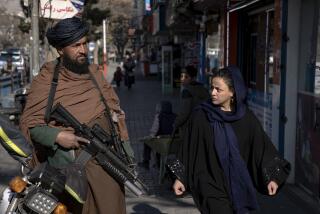In Kabul, Big Changes Among Small Business
KABUL, Afghanistan — At dawn, Sharif, 58, Kabul’s most famous kebab man, goes to buy the best cut of meat and never even haggles about the price. By 12:30 p.m. his kebabs will be sold out, and waiters in his tiny smoked-filled restaurant will have to turn hungry and disappointed people away.
Mohammed Hasan, 55, who has been tailor to kings and government officials for decades, is doing so well, he had to hang a sign in his shop, warning off new customers.
On colorful Flower Street, shopkeepers who used to spend their days joking and singing for lack of customers, now are happily besieged by patrons and traffic jams.
From the poorest carpet weaver to the fat car dealers in Charai Ansari Square, everyone in Kabul says small-scale commerce is humming.
“Now finally I am making money,” Sharif said. “It’s really the first time I have made a lot of money.”
Afghanistan’s economy, shattered by 23 years of war, is gloomy and depressed, so primitive that no one in the government knows the unemployment rate or the balance of trade. They can only guess at the figures, but they know the numbers are bad.
In the post-Taliban era, the striking thing here in the Afghan capital, however, is the thriving entrepreneurial spirit of the small-business men.
Street life in Kabul is dazzling. Gaudy wedding cars race by and elaborately painted trucks lumber about with people perched on top. One recent hot autumn day a foolhardy roller-blader weaved through the crazy traffic.
But beneath the surface, Kabul seems poised between a giant leap into the future, full of optimism and risk, and an abrupt retreat from social change.
Businesses restricted or banned under the Taliban -- tailors, beauticians, music shops, photographers -- are swinging along. Even those that faced no direct restrictions, like restaurants and car traders, are much busier and more profitable.
The Taliban managed to shut out the world. Now, satellite TV is here, an Internet cafe has opened. Crowds of men in restaurants and cafes stare at television screens where scantily clad Indian dancers gyrate hypnotically. But not everyone has adapted to the changes. Religious authorities fear the impact on Afghanistan’s Islamic values. As Kabul whirls through a carnival of change and choice, some are confused, bemused, shocked.
Sher Mohammed, 36, from Ghorband is too afraid and uncertain to venture far from his hotel in central Kabul. He came to the capital to find medical treatment for his ailing 5-year-old son.
At a restaurant Mohammed visited, football and dancing blared on TV. “I don’t like it, why should I tell a lie? And I don’t like the nude pictures I saw at a video seller’s,” he complained.
Still, others are enjoying, and profiting from, a small-business boom.
Lunchtime kebab and rice houses are packed. Ice-cream parlors are thriving, trucking grimy ice from the Salang Gorge to freeze their confections by hand, or buying ice from factories. Florists and bakers are deluged with wedding orders, a far cry from the Taliban days when the middle classes would go to Pakistan for important, festive parties.
Mir Gulab, 70, whose turban business has been in the family for 100 years, is making the same kind of money he did in the era of the Taliban, when every bureaucrat wore a turban. Now, however, he sells more turbans to rural buyers who had not been able to afford new turbans in the Taliban era.
“Actually, business is good. Everyone is richer now,” he said.
When Nazar Mohammed, 45, saw four turban sellers go broke after the Taliban’s fall, he nearly gave up his own turban business. But instead he diversified into vests and waistcoats and pulled his business out of a hole.
“It’s getting better, day by day,” he said.
Sharif, the kebab shop man who has no second name but is known by everyone as Sharif Kebabi, began as an apprentice making kebabs at 13, and opened his own business at 19.
After the Russians invaded in 1979, he hung a portrait of the Soviet space hero Yuri Gagarin on the wall and welcomed lots of Russian customers. His grimmest era was under the Taliban, when the religious police stormed through the neighborhood every lunchtime, forcing people away to pray.
“Before, I could just work to support my family, not make money. I worked for years and could never buy a decent piece of furniture,” said Sharif, who sits cross-legged in the front of this restaurant each day counting the take. “Everyone wants to progress. Everyone wants to move forward.”
The scrawled sign hanging in tailor Mohammed Hasan’s shop tells the story of the roaring demand for his Western-style suits since the fall of the Taliban: “Dear customers,” it reads, “Because of a shortage of apprentices we cannot accept sewing orders.”
He began as an apprentice 48 years ago, at age 7. Now Hasan sews suits only for top government officials, foreigners and loyal customers. He is making 60 suits a month now, compared with six in the Taliban era. He makes about $60 a month. “This work does not make you rich, but it does bring satisfaction, honor, fame,” he said.
Even at the lowest, toughest level among the children who weave carpets, life is better now. Ahmad Faisal, 14, and his four sisters begin the intricate and dull work of carpet weaving at dawn, but at night when it’s too dark to work, the electric light shining from the neighbor’s window is enough to study their schoolwork.
Children in weaving families attend school three or four hours a day, unlike in the Taliban era when neither boys nor girls from such families went. With Ahmad and his four sisters, ages 7 to 16, at school, it’s a big sacrifice in the family’s potential income, but they make $100 a month, enough to survive.
Despite the lost income, going to school is a big improvement, said Ahmad, who became the family breadwinner at 6 when his father was killed by a rocket in Afghanistan’s civil war eight years ago.
“My neighbor has electricity, and I can sit outside his house and use the light to study,” he said.
The return of refugees to Kabul has made finding housing difficult so the family has been living in one room these last three months, with no doors or windows, bathroom, kitchen or power.
Although unemployment is high in Kabul, there are ways to scrape out a living, sometimes literally. On the outskirts of the city, dirt is free.
Abdul Wasy, 15, and his brothers toil in the baking sun, shoveling thick clay from a hole in the ground for bricks, making four times as many as they did just eight months ago.
The teenager and his siblings Abdul Rafi, 13, and Abdul Wali, 11, the sons of a Taliban military official who died of illness last year, come after school to work. They make $100 a month to feed their 12-member family.
As returning refugees rebuild ruined houses around Kabul, demand for bricks has quadrupled since the brothers began work eight months ago; now they make 1,000 bricks a day. The number of brick makers has doubled in that time, Abdul Wasy estimated.
“We didn’t have money for the family, and we saw people doing it and we decided to do it too,” he explained. “It’s tough work. But we are poor people. We have to do this.”
Amid Kabul’s immense social upheaval, trade can be unpredictable.
In one of Kabul’s prestige car dealer shops, a young man sleeps open-mouthed in a Land Cruiser. The owner of the shop, Abdullah Alemi, 36, who started at age 14 or 15 selling Russian Moskvitch cars, draws his legs onto a shabby couch to sit cross-legged, revealing the holes in his socks.
His business was roaring in the immediate aftermath of the Taliban’s fall, when new government officials and foreign organizations ordered 50 cars a month. Now he sells 10 to 15, compared with one a month in the Taliban era.
Sales are still good, but his profit is declining because he has to pay customs duties three times: once to the central government and twice to regional Afghan governors who control the areas his cars have to pass through on the way from Dubai, United Arab Emirates.
His partner, Izmarai, 39, who like many Afghans goes by one name, said the multiple customs payments, along with lack of security and the large number of competing car dealerships that has sprung up since the Taliban left, were their biggest problems.
“The government is not in full control of Afghanistan,” Izmarai said, complaining that the central authorities could not prevent regional governors from demanding customs duties.
“Security is the most important thing. We hope things will get better. The government is trying to form a national army and police force.”
His partner chimed in: “The competition has more than doubled since the Taliban left. Our business is declining. We don’t know how bad it will get.
“Everyone is in the same position. They’re dizzy and wondering. They don’t know whether they’ll make money or lose it.”
Sprouting up weeks after the Taliban fled last November were the video rental shops, a business that seemed a sure-fire moneymaker.
Hamidullah, 32, who goes by one name, took a cousin’s advice and gave up a profitable car detailing business to put all his money into a video rental shop, only to find that many others had the same idea. Worse, electricity in his neighborhood was so sporadic that few people could rent videos.
“The Taliban was very good for my first business. They had so many cars. We were always repairing the seats on their cars. And they always paid on time.
“The other business was better, but I’ll forgive my cousin. It’s not his fault,” he said ruefully. “It’s just fate.”
More to Read
Sign up for Essential California
The most important California stories and recommendations in your inbox every morning.
You may occasionally receive promotional content from the Los Angeles Times.










